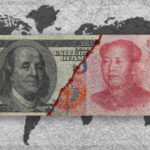Asia’s demand for gold keeps growing – but will it last?
(September 3, 2014 - by Dominic Frisby)

Will Asia still want gold as it gets richer?
To give you an idea of how important gold is considered to be out there, the prime minister was delivering the keynote speech.
Can you imagine David Cameron giving a keynote entitled ‘Gold: Sustaining Future Growth’ over here? It just wouldn’t happen.
The episode has got me thinking about the vastly different attitudes to gold between East and West – and that’s what I want to look at today...
Asia’s demand for gold is growing – the West’s is falling
Looking at worldwide gold demand trends, two things are pretty clear. Asian demand is increasing and Western demand is falling.
In fact, world gold mine production (averaging about 2,800 tonnes per year over the last five years) only just manages to cover Asian demand.
In the chart below (from Nick Laird at Sharelynx), we see Asian demand in red. It has risen almost inexorably since the early 1980s, while Western demand (the blue line) has been falling since 2003.

Last year, Indian gold demand came in at 1,100 tonnes, and Chinese imports through Hong Kong were 1,200 tonnes. Together that is 2,300 tonnes. In total, only 2,600 tonnes of gold were produced outside China. Thank goodness for scrap, recycling and Western selling.
And it’s not just private demand. The Asian percentage of gold held by central banks worldwide (currently about 20%) is steadily rising every year.
We see the same dynamic in production. It is growing in the East and, since 1999, has been falling in the West, as the next chart shows. China is now the world’s largest producer. Russia looks set to replace Australia as the world’s second largest.

An episode like Gordon Brown selling Britain’s gold just wouldn’t happen in Asia – unless there was some kind of emergency. In the East, gold is as important – almost – as it’s ever been. But in the West it’s pretty much irrelevant.
So who’s got it right?
Are the Asians savvy about gold, where we’re ignorant?
Or are their views antiquated, while the more modern and sophisticated West has moved on?
Can gold stay relevant as Asia becomes more middle class?
Wealth is moving from west to east, runs the thinking. The American empire is crumbling, and the European empires have already crumbled. The future is Asian – Chinese, in particular. This vast dynamic is symbolised in falling gold ownership in the West – and increasing gold ownership in the East.
Asian demand is insatiable, Asians understand gold in a way that we don’t, they won’t stop buying, goes the story. The numbers above certainly back up that idea. Some even suggest plans are afoot to start some kind of partly-gold-backed currency to compete with the US dollar and, ultimately, usurp it.
But is it such a dead cert that Asian demand will continue? I’m not so sure. Consider this: gold once played a far greater role in the day-to-day life of an Englishman than it does now. We were on a gold standard, gold was money, gold sovereigns were once pound coins. That hasn’t been the case in the UK for 100 years.
The same goes for any European or American. Gold and silver were money – but then the US made owning gold illegal in 1933. Despite the dollar being on a gold standard, over the next 40 years gold drifted out of mainstream consciousness. By the time ownership was made legal again in 1975, gold was kind of unimportant.
We still wear jewellery, but it tends to be of low purity, and more for decoration than for storing wealth. Even wedding rings rarely exceed 18-carat (75% purity) – far more significant is what the ring represents than what it contains. Some Westerners still invest in gold. But whoever even touches their exchange-traded fund or their vaulted gold?
So if the assumption is right that Asians are hungry for the middle-class lifestyles we take for granted here (and many of them already have it), then, as they become more and more Westernised, surely gold will become as irrelevant to them as it is to us? They’d rather have fridges, cars and nice houses.
Indeed, according to Christopher Corti, formerly of the World Gold Council, and one of the world’s leading assaying experts, Indian jewellery is already starting to go the lower-purity way of the West. Demand among the young for the once-shunned 18-carat gold is on the increase. “They prefer the way it looks. It goes better with the clothes they’re wearing ”, he says.
It’s all a matter of trust
On the plane back home, I was sitting next to a cardiologist – one of a group of several headed to Barcelona for a conference. He and his colleagues had all the trappings of the new Asian wealthy middle class – not least a business class ticket. I put my theory to him that Asian gold demand would fade. He shook his head vehemently.
“Asians want gold. They want it to store their money, their wealth. I suppose it’s an investment.”
“Well, it’s not much of an investment if it’s falling in price,” I suggested. “That won’t continue.”
He shook his head. “It doesn’t matter. They don’t care what the price is. They want to own it. They are going to keep it. They know it will always have value.”
“Do you own gold?” I asked.
“Yes, of course,” he said.
I looked round at the others. They all nodded.
“We all do,” he said. “It is normal. We trust it more than we trust, you know, money.”
“Where do you keep it?” I asked.
“At home”, he shrugged.
I asked him about the Asian financial crisis of 1997-98.
“Yes, we all remember that,” he said, the memory clearly lingering. “It is for times like that, I suppose, that we buy gold. But the desire for gold, the tradition, it goes back a lot further.
“We don’t only like gold because of the Asian crisis. All Asians like gold – Indians especially. As long as they have money, they will buy gold. Malays, Vietnamese, Indonesians. The Chinese are buying more and more. It is normal.”
Of course, this is just one man’s opinion, but it was one that I found in everyone I spoke to – from taxi drivers to waiters to Malaysian gold bugs at the conference. It is normal to own gold.
These attitudes may change as East follows West. But probably not during my investing career.






